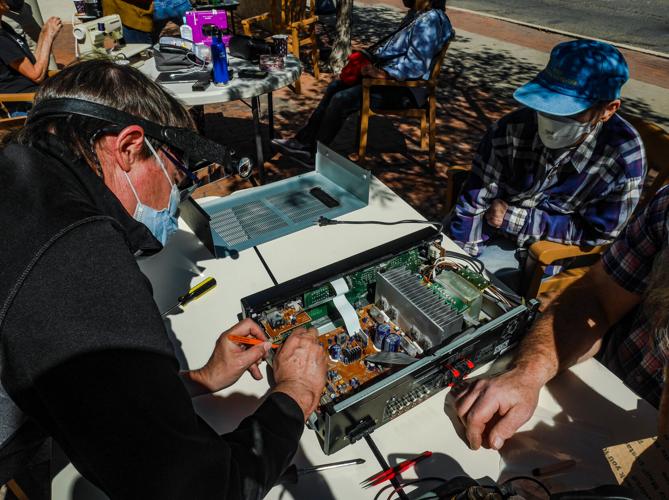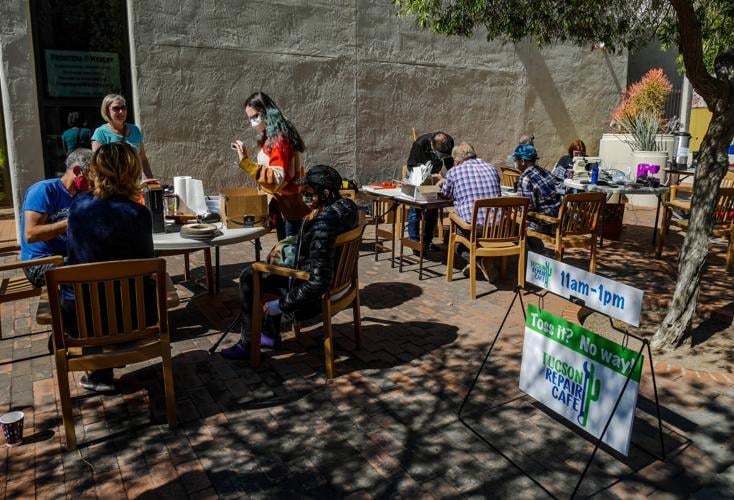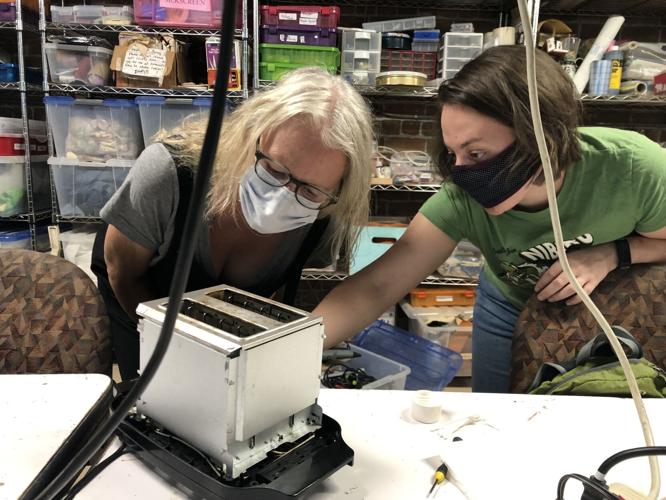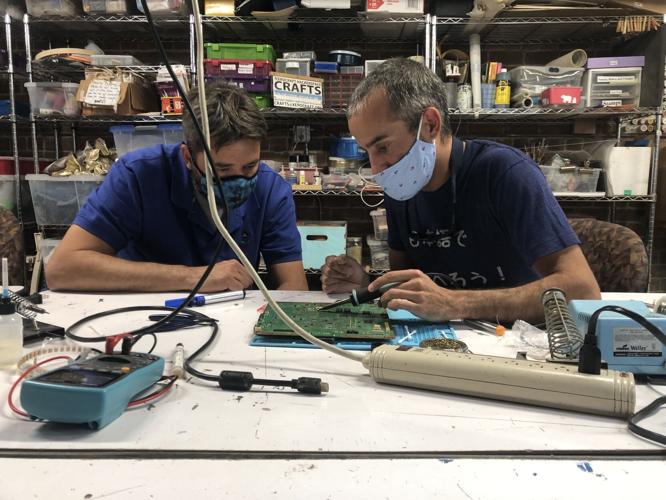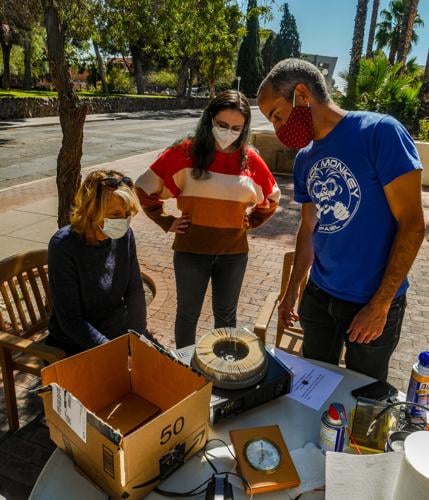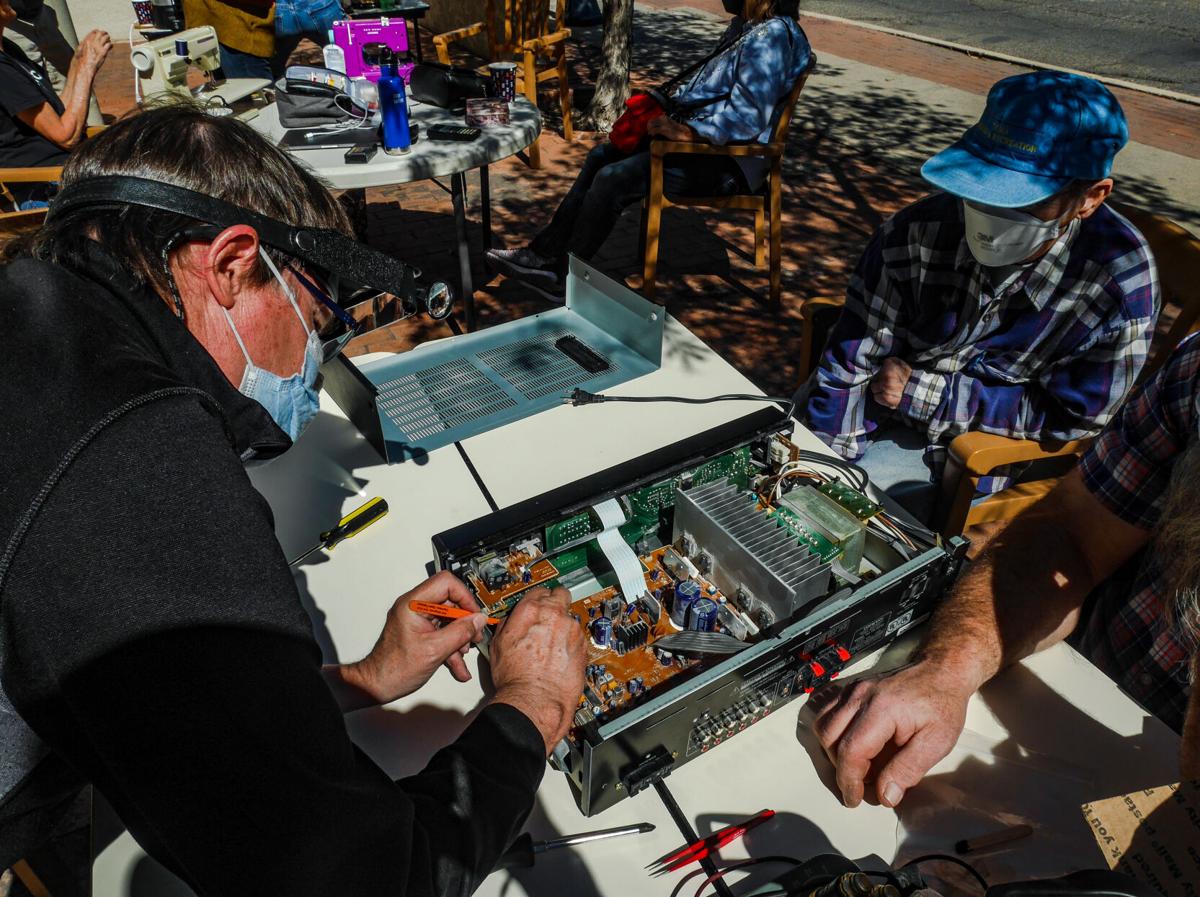Those broken or rundown items collecting dust in your garage are getting a second chance at life with the help of Tucson’s first and only repair cafe.
Tucson Repair Cafe, a local organization working toward 501(c)(3) status, is committed to repairing non-functional items and educating owners on how to continue fixing them in case of needed maintenance in the future.
The goal of the cafe is to help break out of the current “throwaway culture” and take a step toward zero-waste living.
The cost of the cafe’s repair and educational services? Free.
“Tucson Repair Cafe is a place for people to bring in broken items to get them fixed for free. The goal is to reduce waste and reduce consumption and combat this cycle of buy something, have it break, throw it away and buy something new,” said Rocky Baier, co-founder of Tucson Repair Cafe.
The volunteer-run organization hosts a monthly repair event at Xerocraft Makerspace and has recently partnered with other organizations, like Frontera Wesley and the Garden District Neighborhood Association, to bring more satellite events to the Tucson community.

Community members gather at one of Tucson Repair Cafe’s free monthly repair events. The organization hopes to reduce waste in our community by fixing items instead of throwing them away.
Due to the success of their latest event at a local library, the Tucson Repair Cafe has extended its event hours from two to four hours to keep up with all the needed repairs. The group hopes to add more events to their monthly schedule.
“We had more people and things that we could work on than we could get to (in) that time period,” said Stephen Menke, co-founder of Tucson Repair Cafe. “But that's a nice problem. And we got good feedback on that from the people who came and they said, ‘We want more of it.’ So we hope we can do that.”
An international concept brought to the Old Pueblo
The repair cafe concept, which allows “local residents to fix household objects and electronics with the help and advice of enthusiastic volunteers,” was developed in Amsterdam in 2009 by journalist Martine Postma, according to an article by the BBC.
The concept made its way west and finally landed in Tucson last fall, when the Tucson Repair Cafe officially hosted its first event on Nov. 13, 2021.
Since its start in the fall, the Tucson Repair Cafe has fixed toasters, lamps, toys, furniture, DVD players and a PlayStation circuit board, just to name a few. The repair cafe can even do simple fixes like sewing on a button or stitching a hole in well-loved clothing.

Community member Nancy Orr, left, and repairer Amy Lowitz, right, work on repairing a toaster at one of Tucson Repair Cafe’s free events.
If you’re not sure if the broken or worn item you need fixed is too small or too big, the Tucson Repair Cafe encourages you to bring it to one of their events so the repairers can analyze the item and get you set on the right course of action.
All of the fixes go toward a more significant cause: reducing waste in our environment.
“It's very easy to feel powerless in the face of how large the problem seems,” Baier said. “And zero waste is one of the ways that we can really affect meaningful change in our everyday lives. In terms of how zero-waste living can help the community, it helps the community because it's helping the environment.”
According to the Environmental Protection Agency, there were 292.4 million tons of municipal solid waste in the United States in 2018, an average of 4.9 pounds per person every day.
Global electronic waste, which includes items such as cell phones, computers and TVs, reached 44.7 million metric tons in 2016, an equivalent of 4,500 Eiffel Towers, according to the 2017 Global E-Waste Monitor.
“One of the things that resonates with people is when they hear ‘climate change,’ hear ‘zero-waste living,’ they say ‘that's a great idea,’ but they have no idea how to approach it,” Menke said. “So the repair cafe is one way where you can get involved in an aspect of it.”

A community member, left, co-founder Rocky Baier, center, and webmaster and repairer Pete Vieira, right, work on fixing a Kodak Carousel at one of Tucson Repair Cafe’s free monthly events.
Baier and Menke aspire to promote the idea that goods can be repaired to help combat the current staggering global waste statistics.
The idea of repairing versus buying new is already a national movement that’s gaining more traction in the United States. The Right to Repair movement believes that individuals “should have the right to use it, modify it, and repair it whenever, wherever, and however you want,” according to The Repair Association, which advocates for “repair-friendly policies.”
When items, especially electronics, are designed and made to become obsolete within a given timeframe, it can be challenging to curb the rising waste numbers on a national and international scale. But the Right to Repair movement also promotes the idea of companies designing items that can be fixed in the future.
“I think that the more people that demand their companies and the products that they use be repairable, be sustainable, the better,” Baier said. “It's like the same thing with how vegan food is becoming more and more widespread. It's like people are demanding these other options.”
Generations apart, united for a cause
Baier, 23, and Menke, 72, met last spring while participating in Sustainable Tucson’s Zero Waste Working Group. The group’s chair member, Kevin Greene, selected Baier and Menke to bring the international repair cafe concept to Tucson.
Despite their generational differences, Baier says their individual strengths complement one another nicely and fill in “all the gaps to what you need to create a successful business or program like this.”
Baier, a 2020 graduate of the University of Arizona, has a background in journalism and product development and looks at tasks from an agile perspective, she said.
While Menke, a recently retired professor from Colorado State University’s College of Agriculture, has a background in winemaking, making him patient and considerate in timely endeavors.
“When we got assigned, we had to sort of get to know each other better and (we) realized that there are a lot of compatibilities,” Menke said.
Both have invested their own money into the project, but the Tucson Repair Cafe is now actively seeking funding through GoFundMe. The funds will go toward tools, storage space, liability insurance and other necessities to keep the organization running and hosting events around the city.

A community member, left, and repairer and webmaster Pete Vieira solder a PlayStation circuit board at a Tucson Repair Cafe event.
The duo said they would love to host future workshops teaching individuals how to fix certain items or use specific tools and techniques, along with obtaining a small storage space to store larger items that need more repairs in addition to all of the organization’s tools.
“We would love to do that,” Menke said. “But we have to have either somebody volunteer a space or have enough money to rent a space to do that and currently we're not there yet.”
Although the Tucson Repair Cafe is the sole repair cafe in the city, the Right to Repair movement is only getting started in the Old Pueblo. Whether you get an item fixed or volunteer as a repairer or organizer, Baier said it all makes a difference.
“Coming to a repair cafe and getting a random fix, it helps out,” she said. “It's just one thing that they can do to help out the environment and it does make a difference. And it does make an impact. More than they would think.”
If you go
What: Tucson Repair Cafe
When: 4:30-8 p.m. every second Saturday of the month
Where: Xerocraft Makerspace, 101 W. Sixth St.
Cost: Free
Visit the Tucson Repair Cafe's Facebook page for more information.


